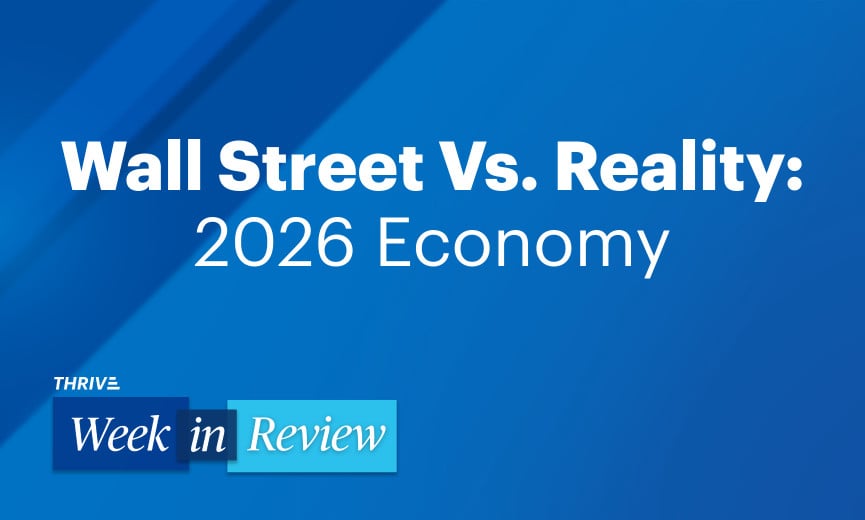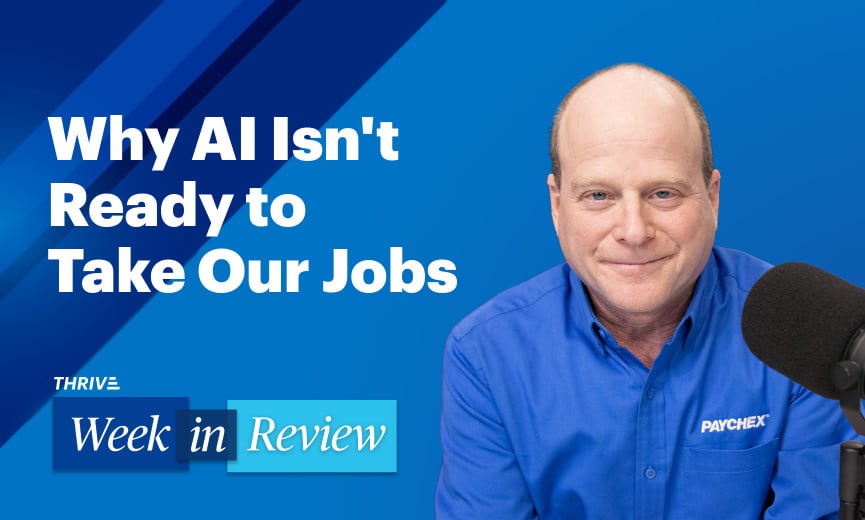- Thrive
-
Season
5Episode52
Legality of Tariffs, De Minimis Exemption Ends, and Quiet Cracking
Podcast •
Watch
Summary
Despite a ruling that tariffs are unconstitutional, the tax on imported goods remains until an appeal by the administration. Gene Marks says businesses have options to get relief and better prepared. This holds true for businesses as additional tariffs must be absorbed when the de minimis exemption expired, meaning even purchases of less than $800 face more taxes. Businesses also face a majority of its employees experiencing quiet cracking – a disenchantment and disengagement with the workplace. Gene suggests employers act quickly; show interest, offer better benefits, and more to head off a problem that is damaging productivity.
Make us an extension of your team: Meet Paychex!
View Transcript
Hey, everybody, it's Gene Marks, and welcome to this week's episode of the Paychex THRIVE Week in Review. This is where we take a few items from the news during this past week, and we talk about them a little bit because they impact your small business in mind.
But listen, before we get started, I just want to say, I mean, chances are if you're a THRIVE listener, you already know running a business takes passion and vision and a whole lot of hard work, but no one said you have to do it all alone.
That's where Paychex comes in. From payroll to HR to employee benefits, they've got the tools and expertise to help you manage your day-to-day operations and focus on what truly matters, which is building your business and achieving your goals. So, see how Paychex can make a difference for you. Get to know them better at paychex.com/meet-paychex. That's P-A-Y-C-H-E-X dot-com/M-E-E-T. Paychex, P-A-Y-C-H-E-X. You can also find the link in our show notes so you can check it out today. Use Paychex. They will help you manage your HR that much better.
Okay, and to the news. We have three news stories this week that are of importance to you and me as business owners, but two of them have to do with the same topic and that has to do with tariffs. So, just this past week, a U.S. appeals court has overturned, or not overturned but sustained, a lower court’s ruling that the tariffs – the reciprocal tariffs that the Trump administration has imposed on countries all around the world, anywhere from 10 to 50% – are illegal and unconstitutional, which basically puts these whole tariff plan that the president has in jeopardy. Or does it?
Well, the federal appeals court has given the president until the middle of October – the Trump administration – to appeal, which means that the tariffs are still in effect for now. Not only that, but the Trump administration fully intends to appeal this, and this will go to the Supreme Court, which holds a majority, six Republican judges sitting there over Democrats on the Supreme Court.
Now, that doesn't necessarily mean just because they hold a majority that the Supreme Court is going to rule in the president's favor. They've not done that in other cases. So, it still remains to be seen whether or not the Supreme Court will agree with the lower courts and basically say that the president's tariffs are unconstitutional. So, we have to just wait and see. We're not really sure even if the Supreme Court hears the case, how long it will take for them to turn around and have a ruling.
Now, before people get all up in arms, just realize that the Trump administration has other tricks in its bag. So, you know, there is the Section 122 of the Trade Act of 1974, which basically gives the president the ability to impose a 15% tariff on any countries that they want to restore balance of payments. They can do it for 150-day limits unless it's extended by Congress, which right now, as we know, is Republican controlled.
There is another section, it's called Section 232 of the Trade Expansion Act of 1962, which gives the president the authority to impose specific tariffs of any amount on specific industries and sectors, as well. So, this is another thing it's up about. I mean, it does involve re-investigations and public comment, but the Trump administration is always working – already working – on some of these alternatives. And Karoline Leavitt, the president's press secretary, said back in the beginning of June, “we can walk and chew gum at the same time.”
Actions are going on behind the scenes if the Supreme Court upholds the lower court's decisions that could keep these tariffs very much in place.
Now, the big question is, what do we do about this? All of this creates a lot of uncertainty for businesses and individuals. So, I've written and we talked about this before on this podcast, but just keep in mind with all this uncertainty going around, you don't know if tariffs are going to be increased, pulled away forever, maintained at a certain level. Strong case for using bonded warehouses where you can receive goods into that warehouse and not pay any tariffs at all until you pull them out of that warehouse and therefore you can kind of wait to see how tariffs come up.
The Small Business Administration has got a new portal called the Making Onshoring Great Again Portal, which helps businesses connect with thousands of local and domestic suppliers, which might be an alternative supplier for you.
And finally, you might want to work with a nonprofit like the World Trade Center Association, which can also help you to connect to suppliers around the world that may be better off for you.
So, still lots of uncertainty that's going to last through the end of the year, I am sure, until the Supreme Court weighs in, and even if they do, the Trump administration will be doing some other stuff.
Now, the second bit of news also has to do with tariffs. Last week, the de minimis exemption expired, which basically means that – before, your purchases over or under $800 were not subject to tariffs from overseas. Now, that exemption has expired. So, all purchases, regardless of the amount, is subject to tariffs.
Now, many believe that will impact a lot of small businesses, and it probably will. Let's not forget there are 33 million small businesses in this country. Many of them there are services: gas stations, pizza shops. They're not really buying anything specifically from overseas, but there are plenty of small businesses that are buying things from overseas, you know, for under $800 they're going to be hit with tariffs, as well.
It's going to impact a small amount of small businesses, but it certainly will impact them. It's going to force them to find alternative suppliers or just raise their prices. Do I think it's going to have this overreaching enormous impact on small businesses across the country? No, but I do think that certain people that are in specialty areas that buy things for under $800 – e-commerce providers, for example, from China and other places – are definitely going to have to increase their prices or figure out another alternative to get around that now that de minimis exemption has expired.
Finally, let's turn to HR. This was a report that was out by the U.S. Chamber of Commerce, and it talks about “quiet cracking.” Not sure if you know what quiet cracking is, but according to a survey that they wrote about from a firm called Talent LMS; They surveyed a thousand employees in the U.S. Quiet cracking refers to “persistent feelings of unhappiness at work, which may lead to disengagement, declining performance and a desire to quit.”
And according to the survey, 54% – more than half of U.S. employees – are suffering from quiet cracking. Now, you know, what is causing all of this? Well, according to the survey, job insecurity is one factor. Another factor is just overall pressure at work to get stuff done with limited time, I guess. There's a disconnect with managers is another reason why people suffer from quiet cracking, and minimal training and recognition is yet another reason.
Now quiet cracking is a thing. More and more people at work are feeling disengaged or disenchanted and unhappy at work. As employers, we can do something about it. And let me tell you something, I consult and visit with companies all around the country. I've met a few fantastic owners who really, really know what they're doing and do not suffer from something called quiet cracking.
I met with an owner who runs a very profitable company in the overhead door business in Maryland who for 30 years has done nothing more than walk around his business and get to know his employees and their families and their lives and talk to them and is very much attuned to whether anybody is going through any issues or problems or whatever.
It's the best thing you could do as a business owner is to just show your employees that they care, that you care about them. They will care about the business, as well. So, it's a matter of reaching out. Now, I realize if you run a company of a certain size, that gets more and more difficult to do, but it's your job to get that message down to your managers who are dealing with employees. Have a lot of performance reviews throughout the year. Give consistent feedback. Be flexible with their time and their time off. Be generous with benefits and compensation. But most importantly, when you're walking around, get to know your employees, take an interest in them and their lives and their families.
Make them know that you care about them, and you will not be one of those 54% where quiet cracking is an issue. Your business will have more longevity with your employees and less turnover because of that.
You've been watching or listening to the Paychex THRIVE week in review. And, again, just want to remember if you need help with any of your HR processes – you want to free up some more time, be more productive – Paychex can definitely help you do all of that. Go to paychex.com/meetpaychex. That's paychex.com/meetpaychex, and you will find out all sorts of ways that Paychex can reduce the time that you're spending on HR while increasing your HR deliverables, as well, and making you more productive and hopefully more profitable.
My name is Gene Marks. Thank you so much for joining us this week. We'll be back again next week with another episode or another segment or another, you know, a part of the Week in Review, the Paychex THRIVE podcast. We'll look at some headlines in the news that impacted your business and mine and we'll talk about them just like we did today. We'll see you again then. Take care.
Do you have a topic or a guest that you would like to hear on THRIVE? Please let us know. Visit payx.me/thrivetopics and send us your ideas or matters of interest. Also, if your business is looking to simplify your HR payroll benefits or insurance services, see how Paychex can help. Visit the resource hub at paychex.com/worx. That's W-O-R-X. Paychex can help manage those complexities while you focus on all the ways you want your business to thrive.
I'm your host, Gene Marks, and thanks for joining us.
This podcast is property of Paychex, Incorporated 2025. All rights reserved.

 Apple Podcast
Apple Podcast Spotify
Spotify iHeartRadio
iHeartRadio









